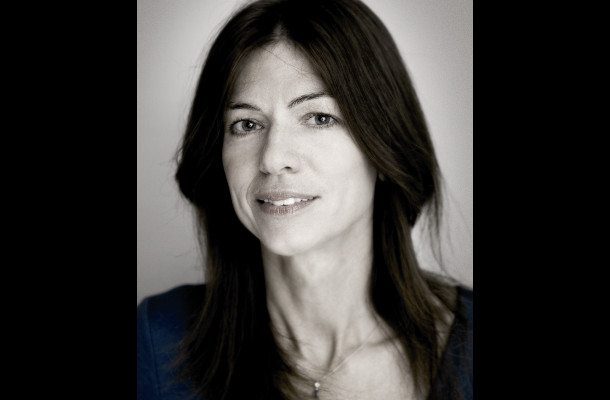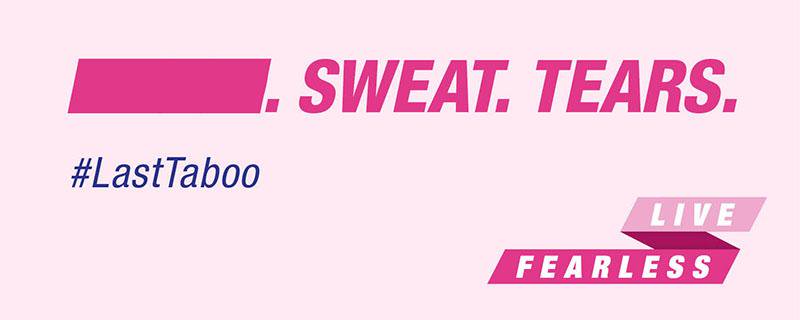
5 Minutes with… Bridget Angear

In 2016 Bridget Angear published her first book, ‘Revolt: A Movement Owner’s Manual’. Co-authored with Alex Lewis who was BBDO’s EMEA head of strategy at the time, it’s described as “a practical guide that lets anyone channel that anger into positive action by building their own movements of change”.
Looking at Bridget’s career as a planner, leading up to her current position as joint chief strategy officer at AMV BDDO, it’s clear that this has been a personal interest for many years. You need only look at her agency’s recent successes at Cannes Lions earlier this summer to see how the agency is trying to change the world for the better with its clients. ‘Trash Isles’ for Plastic Oceans Foundation and LadBible picked up Grands Prix for its efforts to highlight the horrific magnitude of plastic pollution in our oceans by submitting an application to the United Nations to recognise The Trash Isles as an official country. ‘Bloodnormal’ for Bodyform/Libresse won the Glass Lion for Change Grand Prix, for putting period blood front and centre to help destigmatise menstruation.
LBB’s Alex Reeves caught up with Bridget to understand her strategic brain a bit more.
LBB> Changing the world for the better seems to me to be a spirit that a lot of the best AMV BBDO work comes from. Is that an important part of the agency?
BA> Some of the work that I think we do best is with brands like Bodyform, where we’re highlighting the taboos around periods, or Maltesers, when we did our visibility work, or even Guinness - ‘Made of More’ - where we were able to allow gay people to come out in their sports like [Welsh rugby player] Gareth Thomas.
It’s good when brands are willing to confront issues and problems that are bigger than just the product they’re trying to sell. I always think we’ve been given this money - we’ve got a chance to communicate to people. And for me personally I love it when you can use that to create the greatest effect you can. Of course it’s got to be related. Of course you want to sell things, but at the same time if we can change attitudes or challenge taboo or create a purpose for a brand, I feel that then we’re doing things that are of societal good as well as selling.
I think it has always been the work I’m proudest of. I think it probably is a part of our DNA. We’ve always tried to do things like that. We found out a while ago that over half the office had a parent that had been a teacher. It’s full of people who think if they’re not teaching at least they should find a way to give something back to society. It’s just great for people’s souls.
LBB> Is that the feeling that inspired you to write your book, Revolt, with Alex Lewis?
BA> I guess at its heart Revolt is about social causes and using the power that we have as communicators to affect some good in the world and how you do that. I was always taught when I first came into this industry that you should leave things in a better state than you inherit them. That’s something I always try and do.
LBB> So was that the original impetus for writing the book?
BA> Yes. I kept finding examples around the world, looking for inspiration. I kept forwarding interesting things that were being done. And thought, ‘is there a story to work out how these things happened? Is there a consistent element? Rather than a theoretical book, could we write a manual that might help others take on whatever they feel passionate about?’ I wanted it to be a pragmatic, useful thing.
LBB And how did that mission evolve as you wrote it?
BA> I’d been thinking about it for a long time. Eventually I’d told enough people that I was going to write a book that I really had to! There’s something in behavioural economics that if you tell people you’re going to do something, you’re more likely to do it. And I’d got to the point where it was just embarrassing.
The discipline of writing is really hard. I’ve worked on Comic Relief with Richard Curtis for a while. I went to his studio once and there was nothing in it. I said, ‘this isn’t a typically very inspiring place’ and he said, ‘I have to take away every other bit of stimulus that means I just have to write or I’ll find a distraction anywhere I can to avoid writing.’ And now I know why. If I’d put aside some time to write I’d get distracted by looking at my emails to make sure I hadn’t missed something or I’d put the washing on. Anything to avoid the act of writing. Because it’s really hard.
LBB> What did you learn from the process of writing the book?
BA> It confirmed to me that most of these ideas start with a very small group of people who are totally committed to making change happen and that’s the truth of all our projects like Trash Isles. It’s always a small group who really believe in it and drive it. If I think of the brands we’ve done things for that I’m proud of, it’s usually one client who’s been willing to take on a cause and sometimes challenge their own organisations to make something happen. There are always people who will say something’s too risky. But they believe enough to make it happen. It becomes way more than a day job for those people. It becomes a really important part of their own drive and what they do.
If I think about one of the Bodyform clients who’s absolutely driven now by her desire to change things, she’s been offered a promotion off the back of the work she’s done and she’s said she wants to stay where she is because she really believes in what she’s doing.
LBB> As an agency it must be amazing to have a client like that.
BA> It’s the most important thing. If there’s one thing I’ve learnt from years in the business it’s that it takes a giant vision and imagination to make anything good. So we’re very lucky.
LBB> Trash Isles was one of the most memorable success stories at this year’s Cannes. Were you very involved in that project? Why do think it struck such a chord with people?
BA> I’d love to be able to claim credit for it! But I wasn’t. I think it’s just one of those brilliantly creative, natural, ways to come at a problem. And the idea of trying to get a mountain of trash registered as a country certainly seemed to capture people’s imagination. It was also helped by having famous people, whether that was Al Gore or Judi Dench, giving it the stature by being willing to talk about it. Then that idea gets fanned.
I love the fact that I can explain it in one line. They’re always the best ideas. Ok, it’s big enough to be a country. Why don’t we register it as a country?
Of course then it’s all about the craft, execution, how you bring it to life. And that’s where the hard work comes in.
LBB> Is there any particular client that you think is emblematic of the sort of stuff you want to be doing moving forward?
BA> I’ve already mentioned it but I’d definitely cite Bodyform, or Libresse as it’s known on the continent, for beginning to tackle the taboos around periods. The parent company is Essity, which is a small Swedish company whose origins lie in growing trees. They worked out that they could make more money by turning trees into paper - and absorbent paper.
They’re a very shy Swedish company and the work they had been doing in the various categories was very respectable but what you’d expect. We started work with them four years ago and it’s been an evolution from doing what they used to do but a bit better to eventually trusting each other enough to bring something a bit more challenging. I think that’s the sign of a good relationship. It’s been a massive shift for them to put their head above the parapet and tackle some issues.
Internally, it’s taken on a challenge from some other people in their organisation who said, ‘we shouldn’t be doing this.’ And those sorts of battles with clients, you emerge stronger as part of a team. I think they’re immensely proud of the work and so am I.
As a mother you always want to do things that hopefully make it easier for the next generation of girls to come along and not have some of the challenges that we had. I guess that’s what I’m particularly proud of.
LBB> Rewinding a bit, were you actually interested in advertising before you got into it?
BA> I’ve always been interested as a consumer but I’d never really thought about a career in advertising. I’d just finished university and a friend of mine was working at JWT and invited me to come and meet him in the bar in their office. I met him and some other people there and didn’t think anything of it. Then I got a phone call the next day saying ‘do you want a job here or not?’ I actually said, ‘no, I don’t think advertising is for me.’ It was the head of planning who said nobody usually says no and asked me to come and give it a go. I thought I’d give it a few months to see if I liked it. I stayed there nearly 10 years. I was just incredibly lucky to get the chance. I was given a break and I’m very grateful.
LBB> Why didn’t you think advertising was for you to begin with?
BA> I had the perception that you had to be one of the crazy ones to work in advertising. And it was going to be full of eccentric people, mad creative people taking drugs. I felt way too normal to be part of that world.
But I found it interesting almost straight away. And my perception of mad people turned into good people doing things. Interesting, stimulating, eclectic creative people that always had a perspective to bring on things. I’ve always loved being surrounded by those sorts of people.
They motivate me to do my job the best that I can because they’re very smart, these creatives. I feel that I’ve got to help them on their way. I’m always on my toes thinking I’ve got to do something innovative and cool, otherwise they’ll just look at me in that way that says ‘is that it?’ Ultimately, it’s hard work, but you’re there as a planner to think about things and distil down a problem into something that’s manageable and begin to create some potential solutions to that problem.
LBB> You now jointly run the strategy department at the agency. What traits do you look for in a good planner?
BA> The kind of strategists that are not great, in my experience, are those that are really good at defining what the problem is, but not so great at thinking about what the solutions might be. I know it sounds obvious but the best strategists can not only diagnose the problem but they can then create lateral ways out of it. It’s hard to find people who can do both those things.
It’s only in time - the old 10,000 hours - I think what I’ve become good at now is spotting when someone’s come up with a potentially really good answer and I can say ‘out of all the things you’ve said, that’s the one we need to focus on.’ It takes time, confidence and experience to spot those things.
LBB> Were there any projects where that clicked for you or was it a slow dawning?
BA> I think it’s a slow dawning. With Bodyform, the whole thing started after Heather Watson, the tennis player, had crashed out of the Australian Open and had said it was because she had her period and couldn’t play very well. It’s the first time a female athlete had ever acknowledged that she even had a period. When I heard that I thought we’ve just got to do something.
Some creatives wrote a small ad that said, ‘Blood. Sweat. Tears.’ The blood was blocked out and it said #LastTaboo. At the time it ran, and we just ran it tactically after that.
When we were taking on the next brief from the client we kept coming back and saying, ‘there’s more to this we haven’t explored yet. There’s something in this idea that we’ve only just scratched the surface of.’ I guess that’s an example of knowing something’s got potential.

LBB> You've written about the time planners have to spend monitoring and optimising a campaign. What's the key to making sure the big important issues get attention as well as all the smaller but more urgent ones?
BA> I don’t have a neat answer. Quite often Craig [Mawdsley, the other joint chief strategy officer at AMV BBDO] and I are doing similar projects and we divide up who’s doing what. I asked him once how he prioritises what he has to do and he said: ‘I’ll do the thing that I’ll get in the most trouble about if I haven’t done it.’ There are so many things you can do at any one point, it is a case of doing the thing that you know will explode if you don’t do it.
I tend to give myself thinking time. It’s really quiet here first thing in the morning. So I try to give myself two hours from 7:30 until 9:30 where I do the more thinking side of the job. Once or twice a week I go for a run around the park. That’s also where my brain has a chance to process things differently. That helps me sort out problems that I haven’t been able to unlock.
LBB> Are you a keen runner then? Is that one of your big passions?
BA> I’ve always tried to run. You’ve got no excuse because all you need is a pair of shoes. I love running.
And I like reading when I can. I’ll read anything. I’m reading a book about someone who was on the Kindertransport out of Germany in the war. I’ve normally got a few different styles on the go at any point. I’ve had to re-read Byron Sharp because I thought I knew it all but wanted to make sure I wasn’t imagining what he’d written. He’s tried to put some science behind why and how it works. He’s tried to make it fact based rather than just opinion.
And I love listening to BBC Radio 4. It’s my university. How do they do content for 24 hours a day? And some of it is unbelievable. They find all sorts of bizarre topics and people who’ve dedicated their whole lives to becoming specialists in those topics. I find it extraordinary and quite humbling.
So those are my three Rs: running, reading and Radio 4.












